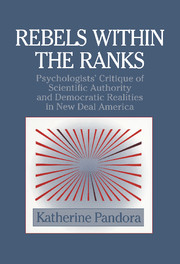 Rebels within the Ranks
Rebels within the Ranks Published online by Cambridge University Press: 06 October 2009
These unhappy times call for the building of plans that … put their faith once more in the forgotten man at the bottom of the economic pyramid.
Franklin D. Roosevelt (1932)By pressing the scientific claims of individuality, Allport and the Murphys signaled their dissatisfaction with the current state of scientific knowledge-seeking in two ways. The study of individuality was first of all justified as an end in itself, in order to right the lop-sided view of nature that they believed scientists had produced by ignoring particulars in favor of universals. But promoting the study of that which is “individual” as a scientific priority was more than a move to supplement already dominant views, for talk of individuality simultaneously represented other challenges as well: to intellectual practices that minimized diversity, broke apart wholes, feared the taint of the subjective, and banished qualities in favor of quantities. As a symbolic rallying point for those who wished to dissent from the status quo in the sciences, a commitment to foregrounding individuality signified a resistance to perpetuating images of scientific method held dear by science's elite.
The concept of universality possesses a status in the Western intellectual tradition that the idea of particularity lacks. The practices and rhetoric of the sciences incorporate a distaste for the investigation of singularities as singularities, subscribing to the belief that such a path offers little hope of obtaining secure and certain knowledge. As philosopher Jorge Gracia remarks, unlike scholarly attention to “universals,” “discussions of the correlative notion of individuality are not abundant and, by comparison with the number and depth of treatments on universals, may even be considered scarce.”
To save this book to your Kindle, first ensure [email protected] is added to your Approved Personal Document E-mail List under your Personal Document Settings on the Manage Your Content and Devices page of your Amazon account. Then enter the ‘name’ part of your Kindle email address below. Find out more about saving to your Kindle.
Note you can select to save to either the @free.kindle.com or @kindle.com variations. ‘@free.kindle.com’ emails are free but can only be saved to your device when it is connected to wi-fi. ‘@kindle.com’ emails can be delivered even when you are not connected to wi-fi, but note that service fees apply.
Find out more about the Kindle Personal Document Service.
To save content items to your account, please confirm that you agree to abide by our usage policies. If this is the first time you use this feature, you will be asked to authorise Cambridge Core to connect with your account. Find out more about saving content to Dropbox.
To save content items to your account, please confirm that you agree to abide by our usage policies. If this is the first time you use this feature, you will be asked to authorise Cambridge Core to connect with your account. Find out more about saving content to Google Drive.